Mākslīgie cilvēki, dabiskie intelekti un saprašanās grūtības: sarunas par MI,
IT un ChatGPT
Konferences sekcijā plānots iztirzāt jautājumus par mijiedarbību starp mākslīgo intelektu (MI), informācijas tehnoloģijām (IT) un cilvēku komunikācijas paradumiem, īpašu uzmanību pievēršot ChatGPT (lielo valodas modeļu) straujajai attīstībai. Dalībnieki ir aicināti aplūkot tematus, kas skar mākslīgā un dabiskā attiecības tehnoloģiju izstrādes nozīmē, komentēt intelekta cilvēciskuma problēmas, iztirzāt, kā veidojas komunikācija starp cilvēku un datoru, tostarp filosofiskas, psiholoģiskas, UI (lietotāja saskarnes) un UX (lietotāja pieredzes) problēmas, kā arī šo tematu iesaistītību valodas un kultūras jomā.
Reģistrācija dalībniekiem ir atvērta līdz 26. februārim.
Reģistrācija klausītājiem ir atvērta līdz 6. martam.
Programma tiks publicēta 1. martā.
Artificial Humans, Natural Intelligences, and the Difficulties of Understanding Each Other: Conversations on AI, IT and ChatGPT
In this conference section we plan to discuss the issues of interaction between artificial intelligence (AI), information technology (IT) and human communication habits, paying special attention to the rapid development of ChatGPT (large language models). Participants are invited to look at topics that deal with the relationship between the artificial and the natural in the context of technology development, to comment on problems of the humanness of intelligence, to discuss the formation of communication between a human and a computer, including philosophical, psychological, UI (user interface) and UX (user experience) problems, as well as the involvement of these topics in the field of language and culture.
Participant registration is open until 26 February.
Listener registration is open until 6 March.
The programme will be published on 1 March.
LU 82. starptautiskās zinātniskās konferences sekcija “Mākslīgie cilvēki, dabiskie intelekti un saprašanās grūtības: sarunas par MI, IT un ChatGPT” tiek rīkota Latvijas Zinātnes padomes Fundamentālo un lietišķo pētījumu projektu programmas projekta “Cilvēciskāki čatboti: komunikācijā balstīti risinājumi lietotāju pieredzes uzlabošanai” (lzp-2021/1-0151) ietvaros.

